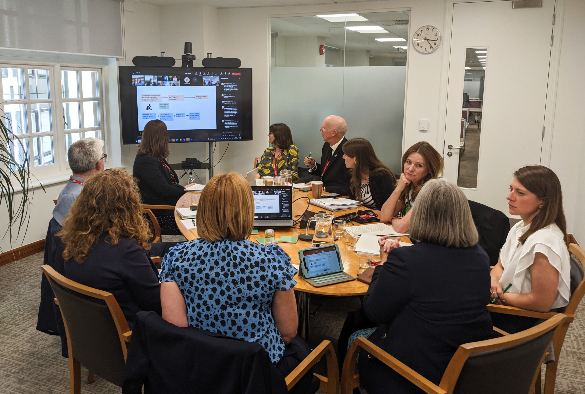
A University of Liverpool-led partnership to improve support for student mental health across the city was showcased at a ministerial summit yesterday.
Minister for Higher and Further Education Michelle Donelan and Minister for Care and Mental Health Gillian Keegan brought together representatives from across the higher education and healthcare sectors to launch a new £3 million scheme to close the gaps between university and NHS services and to showcase examples where integration is already underway.
Attendees at the roundtable including the Office for Students (OfS), Russell Group, Million Plus and NHS England heard from universities who are leading the way in connecting NHS and university services and providing one-on-one support for their students.
Dr Paula Harrison, Director of Student Administration and Support at the University of Liverpool, attended the summit with colleagues from local partner organisations to present the ‘Improving student mental health through partnerships’ project.
The Office for Students-funded project was launched in 2019, and since then the University has been working together with Liverpool John Moores University, Mersey Care, the Innovation Agency, Brownlow Health, and the student unions, to develop improved mental health services for students across the region, and better access to these services.
This has included developing two services under The Liverpool Model – U-COPE (University – Community Outpatient Psychotherapy Education) and The Student Liaison Service – as well as introducing clinical partnership meetings to facilitate more joined up approaches to care.
Paula also discussed the importance of mental health support for students through increased funding and service provision, and the work the Liverpool team has been doing, in a social media interview for the Department for Education.
Speaking about the success of the Liverpool project, Paula said: “Students have really valued being able to access support locally at the University, and that service has been really responsive to their needs. We’re really delighted with the outcomes of the project work we’ve been undertaking in Liverpool and the partnerships that we’ve formed already. We’re pleased that we are going to be able to extend the work that we’ve been doing. We’re now going to be inviting other HEIs in the region to join us over the next year and so we’ll be opening it up to all 65,000 students in the city.”
We're investing up to £3 million over the next academic year to help close the gaps between university and NHS services.
Here, Paula Harrison from @LivUni talks about the importance of mental health support for students through increased funding and service provision ⬇️ pic.twitter.com/xL1DGFV8HL
— Department for Education (@educationgovuk) June 20, 2022